Megawati Sukarnoputri : The Founding Father’s Daughter, A Presidency of Her Own
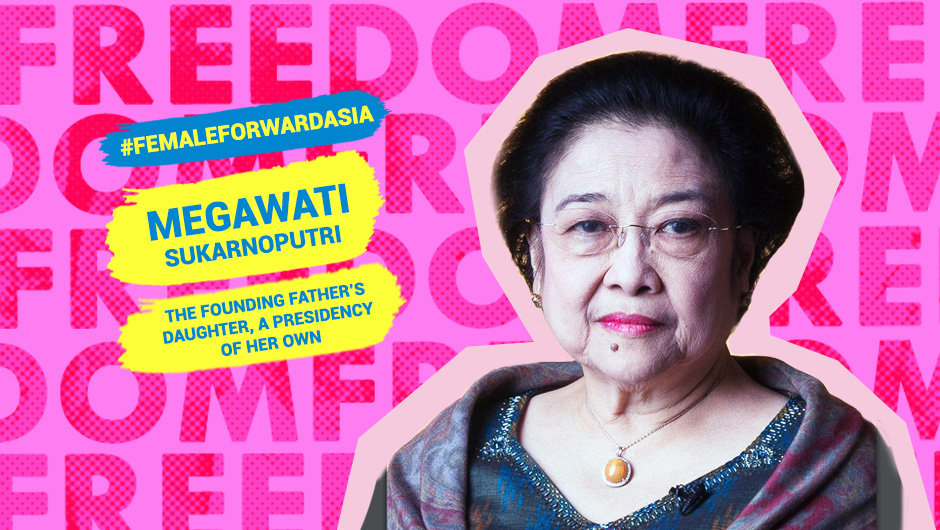
One can only imagine the weight on her shoulders for simply being born as the first daughter of the Founding Father of Indonesia, President Sukarno, who led his country’s independence and later becoming the first president of the world’s biggest predominantly Muslim nation in 1945.
One can only imagine the burden of her heart seeing her own father reluctantly resigning in 1965, a move instigated by a man once trusted by his own father, and, later, witnessing her father incarcerated in the Bogor Palace for three long, sorrowful years until his death. In this unfortunate paradox, the man who freed his country from the colonial shackles of the Dutch became a prisoner of a homegrown tyrant.
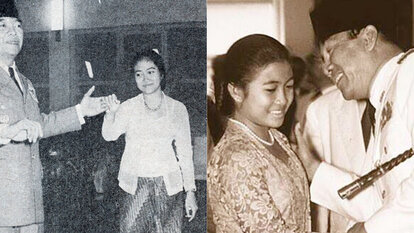
She was the custodian of her father’s legacy. Sukarnoputri literally means “daughter of Sukarno”. But Megawati was more than the descendant of a beloved presidency intervened and ended by the force of a military leader’s iron rule. More importantly, she was, by fate and by popular clamor, the ascendant of a democracy interrupted. Growing up with the burden of the past—both triumphant and tragic; the burden of chartering her country’s future squarely fell on her shoulders during one of its most tumultuous times.
Her mother was the first First Lady of Indonesia, Fatmawati. The woman who wedded a future president when she was but twenty and bore another one four years later had a proud and majestic legacy herself, her lineage can be traced to a Sumatran sultanate. The flag that was hoisted when the world’s fourth most populous nation proclaimed its independence on 17 August 1945 was sewn by Fatmawati. In 1980, after be- ing widowed for a decade, Fatmawati died at the age of 57, leaving behind five children.
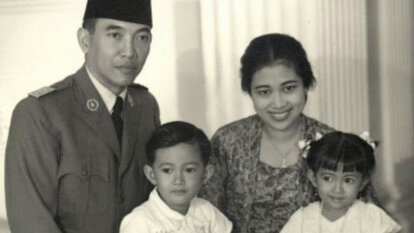
Her death was quiet a blow to the then 33-year old Megawati especially after being orphaned from a father whom she adored and widowed from her pilot-husband whom she loved. Her father’s nemesis had a firm grip of political power and the authoritarian government had zero tolerance for dissent. General Suharto was Sukarno’s Chief of Staff and the message was clear: if Suharto can persecute his former commander in chief—and more importantly, the founding president of the country—then no one would be spared from the grip of his iron hand.
Like many children of long serving world leaders, Megawati grew up in the official presidential residence. The Istana Merdeka in Jakarta was home during her childhood and youth. She was but a toddler when her father became president. As a young adult, she was virtually under house arrest as well for three years. But in her case, it was voluntary as the dutiful daughter spent as much time with his father during the many dark and uncertain days he needed her most. Megawati left college to be with his ailing father. Until she became vice president more than three decades since his father’s ouster, most of her adult life was spent in more modest surroundings, and under much more difficult circumstances.
The transition from Sukarno to Suharto witnessed some of the worst episodes of violence in the 20th century, the events of which were dramatized in the film “The Year of Living Dangerously”. On 1 October 1965, an attempted coup took place in Jakarta, the consequences of which changed national life in Indonesia,” according to the Australian Institute of International Affairs (2015). “The immediate results of its quick collapse were a change in the power balance in Indonesian politics, the purge of the Communist Party and the death of hundreds of thousands of Indonesians.”
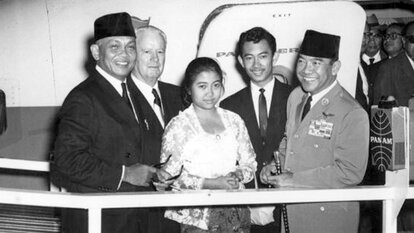
Sri Harsono, her long-time friend who once said that Megawati never wanted to be president, narrated, “Because of Suharto, she couldn’t finish (college). No children of Sukarno were allowed to go to university. They had no money, no education, no jobs. The family was so poor then” (McDonalds, 1999).
It was only after she married Taufiq Kiemas that she was able to live in a guarded and gated neighborhood (McDonalds, 1999). A one-time Speaker of the People’s Consultative Assembly after his wife’s presidency, he encouraged Megawati to contest a parliamentary seat despite her family’s aversion to politics while Suharto was in power (McDonalds, 1999). Her brother Guntur, a former MP, asserted, “We are not cut out for politics. It’s Mega who has staying power. She has guts” (McDonalds, 1999).
Guts and compassion. In 1979, together with friends including Harsono, she opened a flower shop catering to upscale hotels and the proceeds were used to support a kindergarten for poor children (Mcdonald, 1999). Despite her burdened pecuniary situation, she devoted time, effort and money for her country’s people, majority of whom were poor. Despite being a presidential daughter, she had a reputation for modesty and simple living. This public persona added to her appeal later in life, when she would draw some of the biggest crowds and demonstrations in Indonesian history. Furthermore, it was this genuine heartfelt philanthropy and natural compassion for the less fortunate, no matter how modest, that would help define her presidency.
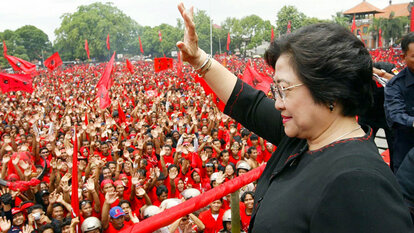
In 1987, at the age of 40, she won a seat in parliament and joined the opposition to Suharto’s continued authoritarianism. She successfully ran as a candidate of the Indonesian Democratic Party (PDI-P), later becoming its leader in 1993. PDI-P, a fusion of Christian and secular nationalist parties, is committed to Pancasila, the first iteration of which was given by Sukarno (Encyclopedia of World Biography, n.d.) Pancasila reflects Indonesian nationalism, humanity and internationalism, democracy, social justice and belief in one God and PDIP considers this as the uniting power of Indonesia, always in the forefront of supporting diversity in the socially, culturally, economically, ethnically and geographically diverse country (Council of Asian Liberals and Democrats, n.d.). In 2009, PDI-P became a CALD full member after being an observer for several years.
Suharto was no different from the many dictators in the region of that era like Ferdinand Marcos, Chiang Kai Shek and Park Chung-Hee. They were strongmen who held a tight grip by terrorizing their citizens with the military as the prime institution to carry such task. And as it was with Marcos, it must have been particularly discombobulating for Suharto to have a woman as the biggest threat to absolute power. And like many dictators in Asia and beyond, his reign ended with remarkable drama.
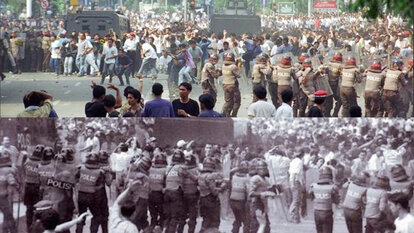
In 1996, Suharto supporters attacked the headquarters of PDIP and the melee result- ed in five deaths and many injuries. The economic crisis in Indonesia was exacerbated by political turmoil. This was a turning point and Megawati became a rallying point for Reformasi, a democratic revolution that ended Suharto’s 22-year authoritarian rule two years later. Aside from Corazon Aquino of the Philippines, comparisons with Pakistani Prime Minister Benazir Bhutto became inevitable.
On May 2000, the Council of Asian Liberals & Democrats (CALD) held a major confer- ence focusing on the theme “Democratic Transitions in Asia” in Jakarta. The conference was postponed a couple of times because of the political uncertainties, including riots, that were taking place in the capital and other parts of Indonesia. But CALD was adamant that there could be no other venue except in Indonesia where such historical transitions were actually taking place. The conference resulted in the publication of a book using the conference theme as its title.
“Cries for freedom and reforms reverberate in all corners of the continent. In Demokrasi, Reformasi, Doi Moi, People Power or by any other name, we witness democ- racy in the region,” then CALD Chairman, Sam Riansy, MP, declared in the said book. “Whether reeling from a long history of foreign domination or homegrown tyranny, the will of the people makes democracy in Asia not only possible but ultimately inevitable. Many voices, united by shared ideals, one in human spirit” (Johannen & Gomez, 2001).
Jusuf Wanandi, a prominent Indonesian political scientist, observed, “She has a charisma she got from her dad. Megawati is incredible with crowds. At a rally here in Jakarta, the crowd was 200,000, very rowdy as usual, and she told them to be silent and sit down. And they did! I’ve never seen anyone else able to do that — except her father” (Mcdonald, 1999).
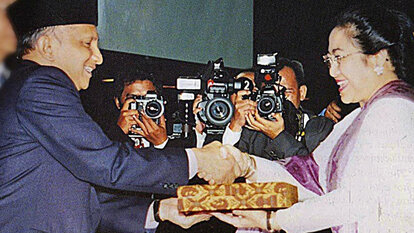
Unlike Cory Aquino, Megawati did not emerge as president as an immediate result of the restoration of democracy. She occupied the second highest office in the land during the presidency of Abduraman Wahid also known as Gus Dur. Wahid, who became a CALD individual member in 2009, belonged to another party—the PKB, another CALD member party since 2016.
Interviewed by Keith Richburg (1999) of the Washington Post, Megawati asserted her mandate to lead the country given her party’s performance in the 1999 Indonesian elections, getting twice as many votes as the second placer, GOLKAR, the party of the last two presidents, Suharto and Habibie. PDI-P did not get enough votes for an outright majority and her gender was viewed as the biggest stumbling block from assuming the highest public office.
In a later interview with the same Washington Post journalist, Wahid explained the dilemma of Megawati assuming the presidency: “If we deny Megawati the presidency, then there will be riots, because her followers are very rough. They can do bad things...But if we take her, the Muslim rightists are also very rough. There will be rioting as well.” With the benefit of hindsight, Megawati must be given credit for not instigating her supporters to rally in protest (Richburg, 1999).
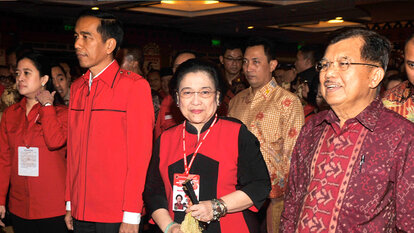
As she once said, again to Washington Post, “In our culture, there is not only a formal leader. There is also an informal leader. Sometimes the informal leader can be more powerful than the formal leader. You can see how my father, even though he has already passed away, in spirit still lives inside the Indonesian people” (Richburg, 1999). Three years later, the informal leader took her oath as the formal leader as well when she was sworn in as the Fifth President of Indonesia.
For Megawati, resiliency did not come as a surprise. She lost her father during the Sukarno family’s lowest point, and she lost a husband while she was pregnant.
“Megawati stabilized the country and oversaw its path to democracy,” said Dewi Fortuna Anwar, a former adviser to B.J. Habibie, who served briefly as president after Suharto. “That’s no mean feat.” She has also been credited for improving security in sev- eral provinces once riven with religious and ethnic violence (The New York Times, 2004).
The daughter of Indonesia’s founding father also attended the birth of another nation: East Timor. Her presence was internationally acclaimed. East Timor was violently annexed during the time of Suharto.
Megawati is the custodian of her mother’s legacy as well. Fatmawati sew Indonesia’s first flag as an independent country. As President herself, it was up to Megawati to mend the tattered pieces of an archipelago of 13,000 islands still reeling from Suharto’s politically and economically disastrous reign. Reformasi was a success but like People Power in the Philippines, it is unfinished.
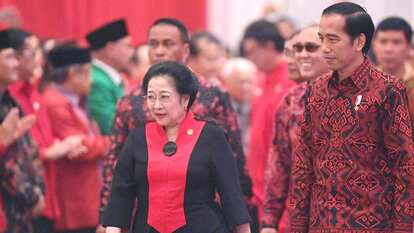
Indonesia is the largest country in Southeast Asia both in terms of geographic size and population; it is the fourth most populated country in the word; and it is the biggest predominantly Muslim country in the world. The success of Indonesian democracy is of global interest. Indonesia is now a living proof that Islam and democracy are compatible.
During the tail-end of Suharto’s reign, Thailand and the Philippines were considered beacons of democracy in Southeast Asia. Now, the tables have been turned. Thailand is under a military dictatorship, and the Philippines is ruled by a populist president notorious for extrajudicial killings and other human rights abuses.
With President Joko Widodo (Jokowi) now at the helm of Indonesia, the legacy of Sukarno is not lost. “Again, the role of PDIP cadres is important,” Jokowi stressed, “and the nation has always looked up to them to work together with the people in the spirit of gotong royong (solidarity)...to ensure that the values of Pancasila are upheld in the community... to improve economic growth, reduce gap, and alleviate poverty” (Tempo. Co, 2018).
As Jeffrey Hutton (2018) of the South China Morning Post reported, “Reformasi, the people-power movement that dumped a dictator and started Indonesia on the road to democracy 20 years ago, was renewed this week as more than 150 million voters turned their backs on dynastic politics opting for competence over connection... (as) voters in three of the country’s biggest provinces elected reformers with proven track records over powerful incumbents... The sweep for reformist candidates bodes well for the re-election chances for the reformist Widodo, whose own background was reflected in some of this week’s winners.”
As Sukarno and his daughter had proven, one’s presidency does not end with his or her term of office, but the legacy and goodwill left behind will have their greatest impact and will benefit more the generations to come.
References
Australian Institute of International Affairs. (2015, August 27). The 1965 attempted “Coup” in Indonesia – “The Year of Living Dangerously”. Retrieved from Australian Institute of International Affairs: https://www.internationalaffairs.org.au/news-item/the-year-of-living-da…
Council of Asian Liberals and Democrats. (n.d.). Indonesia Democratic Party of Struggle. Retrieved from Council of Asian Liberals and Democrats: http://cald.org/member-parties/indonesian-democratic-party-of-struggle
Encyclopedia of World Biography. (n.d.). Encyclopedia of World Biography. Retrieved from Megawati Sukarnoputri:https://www.encyclopedia.com/people/history/southeast-asia-history-biog…
Facts and Details. (n.d.). Fall of Sukarno, Rise of Suharto and The Mysterious Coup of `1965. Retrieved from Facts and Details: http://factsanddetails.com/indonesia/History_and_Religion/sub6_1c/entry…
Johannen, U. & Gomez, J. (2001). Democratic Transitions in Asia. Singapore: Select Books
Hutton, J. (2018, June 29). Reformasi Sweep: Indonesia’s Elections Prove ‘People Power’ Has Legs. Retrieved from South China Morning Post: https://www.scmp.com/week-asia/politics/article/2153166/reformasi-sweep….
Mcdonald, M. (1999, June 19). A reluctant would-be president . Retrieved from The Baltimore Sun: http://articles.baltimoresun.com/1999-06-19/news/9906190285_1_megawati-….
Richburg, K. B. (1999, July 09). Megawati Says She Has Mandate to Lead. Retrieved from The Washington Post: https://www.washingtonpost.com/archive/politics/1999/07/09/megawati-say…
Richburg, K. B. (1999, June 15). Indonesia’s Political Jester Faces a Serious Choice. Retrieved from The Washington Post: https://www.washingtonpost.com/archive/politics/1999/06/15/indonesias-p…
Tempo.Co. (2018, January 11). Indonesia is lucky to have PDIP, says President Jokowi. Retrieved from Tempo.Co: https://en.tempo.co/read/news/2018/01/11/055914736/Indonesia-is-lucky-t…
The New York Times. (2004, October 20). For Megawati, the legacy is mixed. Retrieved from The New York Times: https://www.nytimes.com/2004/10/20/world/asia/for-megawati-the-legacy-i…
_______________________
First published in the book, Compelled by Duty, Conscripted by Destiny, authored by John Joseph S. Coronel, published by the Council of Asian Liberals and Democrats (CALD).